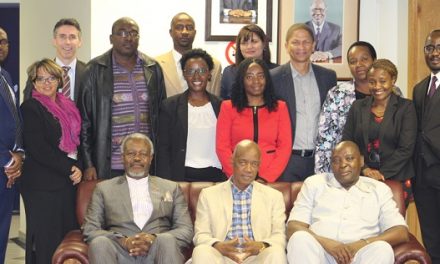
More EC funding for water and sanitation
Tranched financial support from the European Union to the Namibian Water Supply and Sanitation Sector programme has been increased from the current Euro 18 million to Euro 36 million which translates into nearly N$400 million. These funds are channeled through the National Planning Commission which is responsible for the development and establishment of water infrastructure to assist both rural and urban communities.
The support was approved following a request from the National Planning Commission in June 2012 to increase the funding to the sector. The overall objective of the European Commission’s support to the Namibian Water Supply and Sanitation Sector is to support development objectives as defined by the government in its Vision 2030.
At a recent national workshop held in the capital to review the 7th Joint Annual Review report for the Water and Sanitation Sector, Minister of Agriculture, Water and Forestry, Hon John Mutorwa noted that various development partners have been generous to assist water and sanitation development, adding that development funding has contributed significantly to the total development budget of the government. The minister emphasised the importance of financial transparency to continue convincing donor countries to support local development.
Improving the existing public welfare services, and monitoring progress by checking impact and results from several water projects, is also key to ensure funding for developing the water sector.
The purpose of the support is to improve access to potable water and to provide appropriate means of sanitation for the population at large. “This will assist government in achieving the Millennium Development Goals for water supply and sanitation,” said Ambassador Raul Fuentes Milani, Head of the Delegation of the European Union to Namibia, who handed a cheque of Euro 36 Million to the minister.
Poor sanitation is one of the most degrading realities of either living in the bush, or in a Windhoek squatter camp. Primitive societies do not realise the causal link between lack of sanitation, lack of hygiene, and the spread of infectious diseases. According to data provided by the United Nations Children Fund and World Health Organization (UNICEF/WHO) sanitation progress report, there are 2.5 billion people worldwide without access to improved sanitation this year alone.
Although access to safe drinking water in Namibia looks favourable with on average 87% of the country’s population having access to clean potable water, the situation for sanitation, according to Ambassador Milani, is still very challenging, particularly for the rural population where latest statistics indicate that 75% of rural households still lack access to appropriate sanitation facilities. Milani pointed out that factors such as lack of coordination in the sector and rapid urbanization contributed to the sector not meeting its target.
The first tranche of the European Commission budget to the Namibian Water Supply and Sanitation Sector programme of Euro 3 million was released in November 2011 and the second tranche of Euro 5 million, in October this year.










































